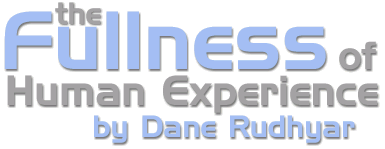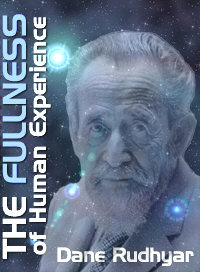 |
| Home | Bio | Art | Music | Literature | Civilization & Culture | Philosophy of Wholeness | Theosophy & Spirituality | Astrology |

CHAPTER SEVEN
A New Frame of Reference: The Earth-being & the Function of Humanity within It - 1 The development of frames of reference If the character and quality of a specific type of knowledge and the expectable results of its application are being discussed, the most fundamental factor to be considered is the frame of reference used in the organization of the data this knowledge correlates. Knowledge implies data interrelated according to a few basic principles which the collective mind of humanity or a group or class of human beings accepts. These principles serve to define the place, the relative importance, and the meaning of the data within a frame of reference which is not only organizational but selective, inasmuch as it eliminates and excludes data which do not "belong," just as it provides patterns of integration for those that do. Funk and Wagnall's Dictionary defines "frame of reference" as "the principles, circumstances, facts, values, etc., needed to inform or orient a person when thinking about, judging or interpreting something." In other words, a frame of reference establishes the basis on which a human mind operates when it attempts to deal with a situation in terms of data, principles, etc. which it considers true and reliable. Knowledge is not provided by the mere succession or simultaneous occurrence of unrelated events. It presupposes a principle of organization according to which the events or data or information have a specific place, and in many instances a function definable in terms of "law." This law is not only related to the frame of reference constituting the background of cosmic, natural, psycho-spiritual, or sociocultural order on which the law operates. Its usefulness and the value of its application are determined by the validity of the selective character of the frame of reference. In the approach to everyday realities often spoken of as "commonsense," human beings deal with the information provided by the senses of their biological organism as it reacts to various kinds and levels of vibratory energy. These impacts reach numerous brain-centers where they become sensations. Persistent groups of sensations are interpreted by various mental processes as material entities, organic or inorganic, moving in an outer world. By entitizing repetitive groups of sensations into bodies it is possible for a person to operate more or less safely or successfully at either the biological or sociocultural level of actions and reactions. The more human beings "know" about the behavior and probable reactions of these entities, the greater their feelings of security, comfort, and presumably happiness, and also the greater their pride at seemingly being able to "control" the energies generated by motion — particularly through heat, gravity, or atomic disruption. In the process of gaining the kind of control known as technology (and in a broader, more ambiguous sense, civilization), our Western world during the last centuries has used a specific frame of reference for knowledge: modern science and the scientific method. This has proven amazingly effective in organizing the results of an immense variety of data of observation. Nevertheless, this method, at least in the way it has operated since the seventeenth century, is highly selective. It excludes all information which does not conform to certain principles of acceptance and even to undemonstrable assumptions. Data for the development of the kind of knowledge approved by our official elite of university professors and scientists have to be obtained exclusively through the senses of the material human body, or through instruments extending the field of operation of these senses, according to rigorously defined procedures requiring a high degree of professional and academic specialization guaranteed by the State. Moreover, these data are considered useable at any time and everywhere in space. They are believed to provide a totally reliable basis on which "laws" and "constants" can be formulated. These mathematical formulations are abstractions which are then managed and correlated through intellectual processes which, in their togetherness, constitute "reason." Reason, at least as understood and used by the classical Greek and European cultures, is a principle of organization assumed to be strictly human and so superior as to be considered by many people as "God given," and greater than any other mode of mental activity. The language of higher mathematics is the rigorously precise by-product of the frame of reference established by the rationalistic mind under the name of logic. This frame of reference is exclusivistic insofar as it considers valid only what has reached the human consciousness, directly or indirectly through the physical senses, and can be interpreted in terms of the activity — the measurable motion — of material entities. The rationalistic and scientific frame of reference used by Western science may be traced back to Aristotle and some of his predecessors, but it only began to dominate European civilization after the Renaissance and the spread of Francis Bacon's ideas. It certainly was not the primordial type of organization of knowledge that developed in tribal cultures operating at the level of almost entirely biological considerations. Nevertheless, the use of the scientific method may be claimed to mark the beginning of mental maturity after a period of naive, childlike assumptions. One may also believe that mental maturity implies the superseding of a subjective type of interpretation of reality by an objective approach to existential data; yet this may be an only partially correct assumption. This kind of objectivity may represent the first stage of maturity — a reaction against the earlier (and not yet entirely vanished) condition of knowledge. This often violent reaction may inevitably produce very dangerous end-results. Because mankind has now to deal with them, it finds itself in a state of global crisis. In order to avoid a planetary disaster — and not only the collapse of all human values or even actual existence — a new frame of reference has not only to be formulated intellectually, but consciously and meaningfully lived. This frame of reference should be planetary, but the adjective planetary now has to be given a new and widely encompassing meaning. I have used the term "Earth-being" in order to suggest some of the implications of that meaning, which are still very difficult for even "New Age" persons to understand, and especially to accept as guiding factors in their lives. By permission of Leyla Rudhyar Hill Copyright © 1986 by Leyla Rudhyar Hill All Rights Reserved.  Web design and all data, text and graphics appearing on this site are protected by US and International Copyright and are not to be reproduced, distributed, circulated, offered for sale, or given away, in any form, by any means, electronic or conventional. See Notices for full copyright statement and conditions of use. Web design copyright © 2000-2004 by Michael R. Meyer. All Rights Reserved. |
 |
